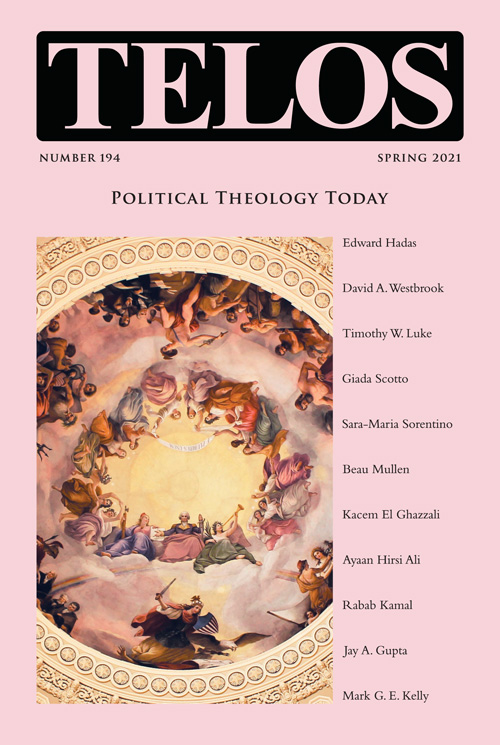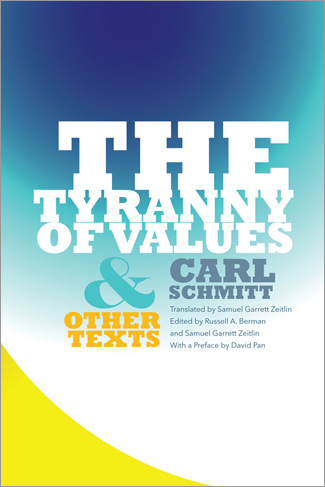By Telos Press · Friday, April 23, 2021 In today’s episode of the Telos Press Podcast, David Pan talks with Tim Luke about his book Screens of Power: Ideology, Domination, and Resistance in Informational Society, recently published in a new edition by Telos Press and available for 20% off in our online store. Their discussion covers a range of topics, including the definition of informational society, the transformation of consumers into data and capital assets, the shift toward permissive individualism and consumerism, the commodification of tradition and religion by televangelism, the rise of politics as televisual spectacle, the changing character of social movements, and the role of critics and intellectuals. Listen the podcast here or through Apple Podcasts, Spotify, Amazon Music, Google Podcasts, or your preferred podcast provider.
Continue reading →
By Telos Press · Tuesday, April 20, 2021 In today’s episode of the Telos Press Podcast, David Pan talks with David A. Westbrook about his article “Social Capitalism: A Descriptive Sketch,” from Telos 194 (Spring 2021). An excerpt of the article appears here, and we are providing free open access to the full article at the Telos Online website. To learn how your university can subscribe to Telos, visit our library recommendation page. Print copies of Telos 194 are available for purchase in our online store.
Listen to the podcast here.
Continue reading →
By Telos Press · Monday, March 22, 2021 To read more in depth from Telos, subscribe to the journal here.
On The Agenda with Steve Paikin, the discussion about governmental responses to the COVID-19 pandemic turned to Thomas Brussig’s recent editorial “Risk More Dictatorship,” originally published in the Süddeutsche Zeitung and translated into English in TelosScope. Listen to the discussion here, and read Brussig’s full essay here, along with Russell Berman’s commentary on it here.
Continue reading →
By David Pan · Friday, March 19, 2021 Telos 194 (Spring 2021): Political Theology Today is now available for purchase in our store. Individual subscriptions to Telos are also available in both print and online formats.
 What does political theology mean today? At the Telos-Paul Piccone Institute conference from which many of the essays in this issue originated, a primary goal was to discuss the crisis of secular liberalism and “how faith is reshaping culture and politics today.” But even this project perhaps limits too much the scope of political theology, implying that we have a choice between reason and faith, or that political theology is a commitment to faith rather than an analysis of the element of faith that underlies all of our endeavors. The idea of political theology begins with the premise that every existing human order is built upon some understanding of ultimate meaning. The task would then be to analyze the kind of meaning that each existing order embodies and determine the kinds of decisions about meaning that are made and need to be made at various points in its history. Even secular liberalism, to the extent that it constitutes an existing order, presumes some answer to this question of meaning, and a closer look at the political theology of the United States reveals a mythic dimension that underlies its liberal democratic processes. The essays in this issue examine the political theological underpinnings of economy, politics, technology, and religion, laying out the ways in which these areas of human life develop not as autonomous spheres but as the result of struggles over a set of political theological choices. What does political theology mean today? At the Telos-Paul Piccone Institute conference from which many of the essays in this issue originated, a primary goal was to discuss the crisis of secular liberalism and “how faith is reshaping culture and politics today.” But even this project perhaps limits too much the scope of political theology, implying that we have a choice between reason and faith, or that political theology is a commitment to faith rather than an analysis of the element of faith that underlies all of our endeavors. The idea of political theology begins with the premise that every existing human order is built upon some understanding of ultimate meaning. The task would then be to analyze the kind of meaning that each existing order embodies and determine the kinds of decisions about meaning that are made and need to be made at various points in its history. Even secular liberalism, to the extent that it constitutes an existing order, presumes some answer to this question of meaning, and a closer look at the political theology of the United States reveals a mythic dimension that underlies its liberal democratic processes. The essays in this issue examine the political theological underpinnings of economy, politics, technology, and religion, laying out the ways in which these areas of human life develop not as autonomous spheres but as the result of struggles over a set of political theological choices.
Continue reading →
By Russell A. Berman · Friday, March 12, 2021 To read more in depth from Telos, subscribe to the journal here.
Former President of the German Bundestag Wolfgang Thierse mounts a powerful argument against identity politics in Germany and their political consequences. His comments here and originally here have elicited a robust discussion in Germany, especially because the current leaders of the Social Democratic Party (SPD), of which Thierse is a long-term member, reportedly responded that they felt ashamed at his “regressive” views. While the leadership represents the current left wing of the party, other voices from the center rallied to Thierse’s defense. At stake is the gap between alternative aspirations within this venerable party, once the foundational political organization of the German left with roots in the workers’ movement of the nineteenth century.
Continue reading →
By Telos Press · Monday, February 22, 2021 In the Spring issue of American Affairs, Blake Smith writes at length about Carl Schmitt’s “The Tyranny of Values,” the title essay of the collection The Tyranny of Values and Other Texts, published by Telos Press. Edited by Russell A. Berman and Samuel Garrett Zeitlin, translated by Samuel Garrett Zeitlin, and with a preface by David Pan, Schmitt’s The Tyranny of Values and Other Texts is now available for purchase in our online store. Save 20% off the list price by using the coupon code BOOKS20 during the checkout process.
An excerpt from the review:
 To those familiar with his most famous writings, it may seem that Carl Schmitt is an enemy of liberalism. In texts such as The Concept of the Political (1932) and Legality and Legitimacy (1932), Schmitt critiqued the Weimar Republic and the liberal tradition, the weaknesses of which Weimar seemed to embody. Liberalism, Schmitt argued, depends on systematic neutralizations—fictions by which all individuals and points of view are imagined to be equal, and by which the confrontations of political life seem to be transformed into peaceful, rule-governed debates with open-ended, undetermined outcomes. His writings during the Nazi era endorsed a new understanding of politics in which such deceptive procedures are replaced by the decisions of a charismatic leader who acts on behalf of a homogeneous people against its internal and external foes. Radicals of the Right and Left have found inspiration in Schmitt’s analysis of liberalism and calls for moving beyond it to a realistic and engaged theory that recognizes the insuperable conflicts at the heart of politics. To those familiar with his most famous writings, it may seem that Carl Schmitt is an enemy of liberalism. In texts such as The Concept of the Political (1932) and Legality and Legitimacy (1932), Schmitt critiqued the Weimar Republic and the liberal tradition, the weaknesses of which Weimar seemed to embody. Liberalism, Schmitt argued, depends on systematic neutralizations—fictions by which all individuals and points of view are imagined to be equal, and by which the confrontations of political life seem to be transformed into peaceful, rule-governed debates with open-ended, undetermined outcomes. His writings during the Nazi era endorsed a new understanding of politics in which such deceptive procedures are replaced by the decisions of a charismatic leader who acts on behalf of a homogeneous people against its internal and external foes. Radicals of the Right and Left have found inspiration in Schmitt’s analysis of liberalism and calls for moving beyond it to a realistic and engaged theory that recognizes the insuperable conflicts at the heart of politics.
Continue reading →
|
|









